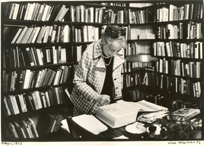“Ethical Fading” under Conditions of Totalitarianism
An oped piece by two business professors, Max H. Bazerman and Ann E. Tenbrunsel, in yesterday’s New York Times triggered an association to Arendt’s arguments in Eichmann in Jerusalem. Even though the researchers make no use of her ..
- Posted by Kathy J.
- Posted in Eichmann Trial,Hannah Arendt,personal responsibility,thinking
Action and Engaged Scholarship: Tiya Miles
In her book, Men in Dark Times, Hannah Arendt created portraits of those whose lives illuminated an era. “Even in the darkest of times,” she wrote, “we have the right to expect some illumination…[S]uch illumination may ..
- Posted by Kathy J.
- Posted in Hannah Arendt,personal responsibility
Public Happiness: Action in Concert with Others
In the summer of 1970, Hannah Arendt was interviewed by Adelbert Reif, a German writer, who asked her to expand on comments she had made in On Violence about the revolutionary student movements of the 1960s. Her remarks, published in Crises of..
- Posted by Kathy J.
- Posted in Hannah Arendt,personal responsibility,Politics
Welcome NEH Summer Scholars to NEH Arendt 2014
After careful deliberation, my committee members and I selected the 2014 Summer Scholars who will study the political theory of Hannah Arendt under my direction this summer at Bard College’s Hannah Arendt Center for Politics and the Huma..
- Posted by Kathy J.
- Posted in education,Eichmann Trial,Hannah Arendt,Hannah Arendt Center for Politics and Humanities,Hudson Valley,Humanities Magazine,Life of the Mind,NEH,NEH Summer Scholars,personal responsibility,Politics,public life,public space,Religion and Politics,summer scholars,teachers,The Human Condition,The Origins of Totalitarianism,thinking
Reading Eichmann in Jerusalem
Fifty years ago, Hannah Arendt published her controversial report on the trial of Nazi deportation commander, Adolf Eichmann: Eichmann in Jerusalem: A Report on the Banality of Evil. The book put Arendt at the center of a storm of criticism th..
- Posted by Kathy J.
- Posted in education,Eichmann Trial,evil,Hannah Arendt,Hannah Arendt Center for Politics and Humanities,Hudson Valley,Humanities Magazine,NEH,NEH Summer Scholars,personal responsibility,public life,public space,teachers,thinking,uncertainty
Eichmann’s Thoughtlessness and Arendt’s Judgment
We are now about four weeks away from the start of my NEH Arendt seminar at Bard College’s Hannah Arendt Center for Politics and the Humanities, when I will join 16 other educator/colleagues from across the country for a summer of schola..
- Posted by Kathy J.
- Posted in education,Eichmann Trial,evil,Hannah Arendt,Hannah Arendt Center for Politics and Humanities,NEH,NEH Summer Scholars,personal responsibility,Politics,public life,summer scholars,teachers,The Human Condition,The Origins of Totalitarianism,thinking
Education and Ethics: Agency and Love of the World
The question of character and education emerge in the course of our seminar on Arendt exploring the concept of judgment and Arendt’s argument that those who failed to “think for themselves” often became supporters of totalitarianism. In ..
- Posted by Kathy J.
- Posted in character,education,ethics,Hannah Arendt,human rights,Life of the Mind,NEH,NEH Summer Scholars,personal responsibility,public life,teachers,thinking
NEH Seminar: The Movie
It’s been less than a week since I was notified that the NEH seminar for schoolteachers on the political theory of Hannah Arendt will be funded for summer 2016, but I already am at work getting plans in place for next summer’s seminar ..
- Posted by Kathy J.
- Posted in character,education,Hannah Arendt,Hannah Arendt Center for Politics and Humanities,Hudson Valley,Life of the Mind,NEH,NEH Summer Scholars,personal responsibility,public life,public space,summer scholars,teachers,thinking
Controversy in Eichmann in Jerusalem
Among the many controversial aspects of Hannah Arendt’s Eichmann in Jerusalem, which originally appeared as a multi-part series in The New Yorker, the most incendiary points she made appeared in chapter VII. In that section of the book, enti..
- Posted by arendt
- Posted in banality of evil,Barbara Demming,Eichmann in Jerusalem,Eichmann Trial,ethics,evil,genocide,Hannah Arendt,Jewish Councils,Judenrat,NEH Summer Scholars,personal responsibility,Raul Hilberg
Considering Totalitarianism
The response around the globe to the election of Donald Trump to the presidency of the United States has ranged across a spectrum. Applause came, of course, from Trump supporters who voted for him. The majority of these were white voters, men ..
- Posted by arendt
- Posted in banality of evil,character,displaced persons,education,ethics,evil,Hannah Arendt,personal responsibility,Politics,public life,public space,teachers,The Origins of Totalitarianism,thinking


